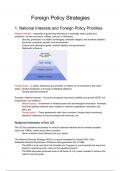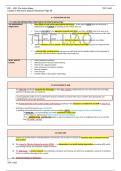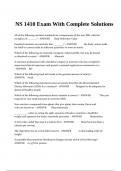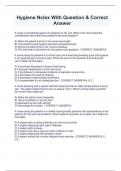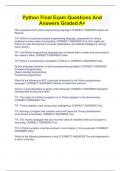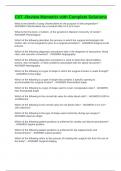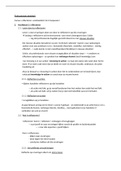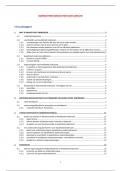Foreign Policy Strategies
1. National Interests and Foreign Policy Priorities
National interest – rationality of governing referring to a sovereign state’s goals and
ambitions, be they economic, military, cultural, or otherwise
- Security, protection of a state's sovereignty, territorial integrity, and domestic stability
- Economic prosperity, growth, and development
- Cultural and ideological goals, political stability, and governance
- Diplomatic influence
Foreign policy – a state’s objectives and activities in relation to its interactions with other
states, whether bilaterally or through multilateral platforms
- Usually planned long-term
Example: National Interest – Economic prosperity (economic stability and growth (GDP), full
employment, low inflation)
- National policy – investment in infrastructures and technological innovation, monetary
and fiscal policies (interest rates, taxation), business regulations, education and
skills, etc.
- Foreign policy – Trade agreements with other countries, foreign direct investment
attraction, diplomacy to secure energy and resources, etc.
National Interests of the US
The US has published documents on what its national interests are for several decades
(since the 1980s), unlike many other countries.
- Some countries have followed suit (e.g. Spain)
The National Security Strategy (NSS) is a report mandated by Section 603 of the
Goldwater-Nichols Department of Defense Reorganization Act of 1986.
- The NSS is to be sent from the President to Congress to communicate the executive
branch’s national security vision to the legislative branch.
- The NSS discusses proposed uses of all facets of U.S. power needed to achieve the
nation’s security goals.
, - The report is obligated to include a discussion of U.S. international interests,
commitments, objectives, and policies, along with defense capabilities necessary to
deter threats and implement U.S. security plans.
Although Congress had the duty to publish an NSS yearly, it did not. Congress skipped
some years because the U.S.’s national interests stayed the same and did not change much
over time. This occurs in many other countries as well.
Obama 2015 National Interests Trump 2017 National Interests
The security of the U.S., its citizens, and
U.S. allies and partners.
A strong, innovative, and growing U.S.
economy in an open international economic
system that promotes opportunity
USA First NSS (1987)
- It was more about security (the first level of the policy hierarchy). Now, priorities have
expanded.
National Interests of the EU
Most EU countries have their own versions of a national security strategy. For example:
- France’s Defense and National Security Strategic Review
- Germany’s White Paper on German Security Policy
- Spain’s National Security Strategy
However, the EU itself also has its own ”national security” vision and strategy, regarding
areas such as migration security, an EU army, national integrity, trade, dependence on third
countries, and democracy and populism.
EU interests and values go hand in hand. The EU is interested in promoting its values
around the world. At the same time, its fundamental values are embedded in its interests.
Peace and security, prosperity, democracy, and a rules-based global order are the vital
interests underpinning its external action.
The priorities of EU external action:
- The security of the union: Security and defense, Counter-terrorism, Cybersecurity,
Energy Security
- State and societal resilience to the east and south: Enlargement Policy, Neighbors,
Resilience in surrounding regions, A more effective migration policy
- Global governance for the 21st century
US vs. EU
, Obama Trump Biden
Security 1. Defense 1. Secure 1. Security and
2. Terrorism borders (incl. defense
3. WMD WMD, etc.) 2. Counter-terroris
4. Climate change 2. Terrorism m
5. Global Health 3. Cyber security 3. Cyber security
4. Energy security
Prosperity 1. Our economy 1. Domestic 1. Strong internal
(Economy) 2. Energy security economy market
3. Lead in R&D 2. Free & fair 2. An open
trade international
3. Lead in R&D economic
system
Values 1. Our values 1. Aspiring Living up consistently
2. Equality partners to our values internally
3. Emerging 2. Better will determine our
democracies outcomes external credibility and
IMOs influence.
3. American
values
International 1. Asia Pacific 1. Indo Pacific 1. Enlargement
Order 2. Europe 2. Europe 2. East. Europe &
3. MENA 3. Middle East Mediterranean
3. MENA & Africa
General notes on US v. EU foreign policy priorities:
- The US is rich in resources but the EU is not, so energy security is more important to
the EU.
- Both want a strong economy, but the EU is more focused on building the internal
market, while the US’s goal is more to be the global economic leader.
- The EU looks more at values internally and credibility externally. Not everyone in the
EU believes in EU values (Are EU values even the same for everyone?).
- US foreign policy is more about global order and the threats of global leadership. The
EU is more focused on enlargement and its neighbors.
- Certain things are endowed by states (e.g. their neighbors).
- Up to 1991, the very clear focus of the US was on the USSR. The US in general was
very Europe-focused.
- Then, 9/11 made the Middle East the focus for a decade.
- Pulling away from that, around 2010, Asia Pacific became more important.
- The Ukraine conflict brought the EU back as a foreign priority, though the US
continues to spend its resources in Asia.
- What will happen to EU security if the US spends its resources in
Asia?
- Instead of using the word “Asia,” the US began to use “Indo-Pacific” because it
realized that India could emerge as a major American ally (military and economic
, partner). This nomenclature thus serves to isolate China as a major international
rival.
- Today, the US is more focused on China and Russia (two big rivals), like it was with
Afghanistan and Iraq in the early part of the century.
National Interests of Spain
The Estrategia de Seguridad Nacional 2021 is the fourth of its kind (following the ESN 2011,
2013, and 2017).
Spain is internally divided (e.g., civil wars, secessionist movements), so it largely pushes for
collective EU values rather than Spanish ones.
Spain NSS 2021
Geopolitical Socioeconomic Digital Ecological
Increasing Unequal economic Hyper-connected Climate crisis
geopolitical recovery populations
competition Extreme weathers
Increasing Disruptive
Deterioration of protectionism technologies Changes in the
multilateralism energy paradigm
Political polarization Digital ethics and
Growing regional human rights Competition for raw
powers Fragile global materials
logistics
Risks and threats:
- The economy is not as strongly mentioned in Spain’s NSS because Spain is more
focused on security, the powers over which Spain ceded to the EU.
- Spanish values are not really mentioned in the NSS. It mostly focuses on
multilateralism and the importance of the role of the EU. This is because Spain has a
stronger role internationally with the EU.
National Interests of Russia
The Russian Federation’s consistent policy of strengthening defense capability, internal
unity, and political stability, modernizing the economy, and developing industrial capacity has
strengthened Russia’s sovereign statehood as a country.
External attacks:
- Attempts to interfere externally in the internal affairs of the Russian Federation are
effectively thwarted.
- The use of the Russian language is restricted, Russian media activities and the use
of Russian information resources are banned, and sanctions are imposed on Russian
athletes.
- Russian citizens and compatriots living abroad are discriminated against and openly
persecuted.
1. National Interests and Foreign Policy Priorities
National interest – rationality of governing referring to a sovereign state’s goals and
ambitions, be they economic, military, cultural, or otherwise
- Security, protection of a state's sovereignty, territorial integrity, and domestic stability
- Economic prosperity, growth, and development
- Cultural and ideological goals, political stability, and governance
- Diplomatic influence
Foreign policy – a state’s objectives and activities in relation to its interactions with other
states, whether bilaterally or through multilateral platforms
- Usually planned long-term
Example: National Interest – Economic prosperity (economic stability and growth (GDP), full
employment, low inflation)
- National policy – investment in infrastructures and technological innovation, monetary
and fiscal policies (interest rates, taxation), business regulations, education and
skills, etc.
- Foreign policy – Trade agreements with other countries, foreign direct investment
attraction, diplomacy to secure energy and resources, etc.
National Interests of the US
The US has published documents on what its national interests are for several decades
(since the 1980s), unlike many other countries.
- Some countries have followed suit (e.g. Spain)
The National Security Strategy (NSS) is a report mandated by Section 603 of the
Goldwater-Nichols Department of Defense Reorganization Act of 1986.
- The NSS is to be sent from the President to Congress to communicate the executive
branch’s national security vision to the legislative branch.
- The NSS discusses proposed uses of all facets of U.S. power needed to achieve the
nation’s security goals.
, - The report is obligated to include a discussion of U.S. international interests,
commitments, objectives, and policies, along with defense capabilities necessary to
deter threats and implement U.S. security plans.
Although Congress had the duty to publish an NSS yearly, it did not. Congress skipped
some years because the U.S.’s national interests stayed the same and did not change much
over time. This occurs in many other countries as well.
Obama 2015 National Interests Trump 2017 National Interests
The security of the U.S., its citizens, and
U.S. allies and partners.
A strong, innovative, and growing U.S.
economy in an open international economic
system that promotes opportunity
USA First NSS (1987)
- It was more about security (the first level of the policy hierarchy). Now, priorities have
expanded.
National Interests of the EU
Most EU countries have their own versions of a national security strategy. For example:
- France’s Defense and National Security Strategic Review
- Germany’s White Paper on German Security Policy
- Spain’s National Security Strategy
However, the EU itself also has its own ”national security” vision and strategy, regarding
areas such as migration security, an EU army, national integrity, trade, dependence on third
countries, and democracy and populism.
EU interests and values go hand in hand. The EU is interested in promoting its values
around the world. At the same time, its fundamental values are embedded in its interests.
Peace and security, prosperity, democracy, and a rules-based global order are the vital
interests underpinning its external action.
The priorities of EU external action:
- The security of the union: Security and defense, Counter-terrorism, Cybersecurity,
Energy Security
- State and societal resilience to the east and south: Enlargement Policy, Neighbors,
Resilience in surrounding regions, A more effective migration policy
- Global governance for the 21st century
US vs. EU
, Obama Trump Biden
Security 1. Defense 1. Secure 1. Security and
2. Terrorism borders (incl. defense
3. WMD WMD, etc.) 2. Counter-terroris
4. Climate change 2. Terrorism m
5. Global Health 3. Cyber security 3. Cyber security
4. Energy security
Prosperity 1. Our economy 1. Domestic 1. Strong internal
(Economy) 2. Energy security economy market
3. Lead in R&D 2. Free & fair 2. An open
trade international
3. Lead in R&D economic
system
Values 1. Our values 1. Aspiring Living up consistently
2. Equality partners to our values internally
3. Emerging 2. Better will determine our
democracies outcomes external credibility and
IMOs influence.
3. American
values
International 1. Asia Pacific 1. Indo Pacific 1. Enlargement
Order 2. Europe 2. Europe 2. East. Europe &
3. MENA 3. Middle East Mediterranean
3. MENA & Africa
General notes on US v. EU foreign policy priorities:
- The US is rich in resources but the EU is not, so energy security is more important to
the EU.
- Both want a strong economy, but the EU is more focused on building the internal
market, while the US’s goal is more to be the global economic leader.
- The EU looks more at values internally and credibility externally. Not everyone in the
EU believes in EU values (Are EU values even the same for everyone?).
- US foreign policy is more about global order and the threats of global leadership. The
EU is more focused on enlargement and its neighbors.
- Certain things are endowed by states (e.g. their neighbors).
- Up to 1991, the very clear focus of the US was on the USSR. The US in general was
very Europe-focused.
- Then, 9/11 made the Middle East the focus for a decade.
- Pulling away from that, around 2010, Asia Pacific became more important.
- The Ukraine conflict brought the EU back as a foreign priority, though the US
continues to spend its resources in Asia.
- What will happen to EU security if the US spends its resources in
Asia?
- Instead of using the word “Asia,” the US began to use “Indo-Pacific” because it
realized that India could emerge as a major American ally (military and economic
, partner). This nomenclature thus serves to isolate China as a major international
rival.
- Today, the US is more focused on China and Russia (two big rivals), like it was with
Afghanistan and Iraq in the early part of the century.
National Interests of Spain
The Estrategia de Seguridad Nacional 2021 is the fourth of its kind (following the ESN 2011,
2013, and 2017).
Spain is internally divided (e.g., civil wars, secessionist movements), so it largely pushes for
collective EU values rather than Spanish ones.
Spain NSS 2021
Geopolitical Socioeconomic Digital Ecological
Increasing Unequal economic Hyper-connected Climate crisis
geopolitical recovery populations
competition Extreme weathers
Increasing Disruptive
Deterioration of protectionism technologies Changes in the
multilateralism energy paradigm
Political polarization Digital ethics and
Growing regional human rights Competition for raw
powers Fragile global materials
logistics
Risks and threats:
- The economy is not as strongly mentioned in Spain’s NSS because Spain is more
focused on security, the powers over which Spain ceded to the EU.
- Spanish values are not really mentioned in the NSS. It mostly focuses on
multilateralism and the importance of the role of the EU. This is because Spain has a
stronger role internationally with the EU.
National Interests of Russia
The Russian Federation’s consistent policy of strengthening defense capability, internal
unity, and political stability, modernizing the economy, and developing industrial capacity has
strengthened Russia’s sovereign statehood as a country.
External attacks:
- Attempts to interfere externally in the internal affairs of the Russian Federation are
effectively thwarted.
- The use of the Russian language is restricted, Russian media activities and the use
of Russian information resources are banned, and sanctions are imposed on Russian
athletes.
- Russian citizens and compatriots living abroad are discriminated against and openly
persecuted.

